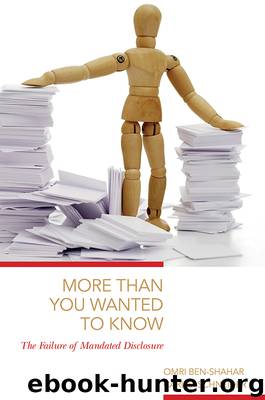More Than You Wanted to Know by Ben-Shahar Omri Schneider Carl E

Author:Ben-Shahar, Omri, Schneider, Carl E.
Language: eng
Format: epub
Publisher: Princeton University Press
Published: 2014-07-28T16:00:00+00:00
CONCLUSION TO PART II
Part I reviewed evidence that mandated disclosure fails so often that it is a suspect regulatory form. Part II asked why it fails. It found that the reasons run so deep that mandated disclosure cannot hope to succeed often.
Part II abandoned the assumption that mandated disclosure is the answer to the question of what information someone would have needed to make a better decision. Instead, it asked how mandated disclosure looks to disclosees. In short, it ill fits the way people live their lives and make their choices. People do not seize decisions with the eagerness disclosurites suppose, nor do they make decisions in the fully informed way disclosurites assume. Rather, people tend to leave disclosures unused, defeating disclosure before it starts. This produces some poor choices, yet people have good reasons for rejecting the gift of disclosure. Briefly, they don’t think the game is worth the candle. It means taking on unpleasant work and giving up more pleasant work. And on assessing the educational labor mandated disclosure offers, people reasonably fear sowing much and reaping little.
Specifically, chapter 5 showed how illiteracy can keep people from using disclosures well, can cause people to use them poorly, and can keep people from using them at all. Illiteracy is protean. It includes the inability to understand words, sentences, and paragraphs and the inability to understand even quite simple numbers. Sector illiteracy can defeat even people who read without difficulty. And even the sector literate may be insufficiently specialized within the sector to profit from disclosures.
Chapter 6 reviewed another cognitive barrier to mandated disclosure—the quantity question. Disclosures are often more overwhelming than helpful. And the parable of Chris Consumer taught a related lesson—people are daily so assailed by information that they cannot attend to most of it and still have a life. Decision aversion then seems prudent, not feckless.
Finally, chapter 7 looked at writing in psychology and behavioral economics. For disclosurites, the study of how people misperceive and misapply information opens the door to disclosure that works. For us, however, the lesson is that nobody can write mandates that account for the many unexpected ways people read disclosures.
We have never argued, we repeat, that all disclosures fail. But we do argue that while some disclosures sometimes do some people some good, they cannot reliably achieve their goal of improving decisions in the way that disclosurites wish. Part II has described problems with disclosures too profound to be solved. You can’t get rid of decision aversion because it makes too much sense in people’s lives. You can’t fix illiteracy without titanic social efforts to move the populace to unrealistic levels of skill and understanding. You can’t get rid of the quantity question because unfamiliar and complex issues keep arising. You can’t get rid of the things that distort people’s handling of unfamiliar and complex decisions because those habits serve them well in most of their lives.
We have not exhausted the defenses its proponents mount for mandated disclosure. We have not dealt with proposals for fixing it (primarily by simplifying disclosures).
Download
This site does not store any files on its server. We only index and link to content provided by other sites. Please contact the content providers to delete copyright contents if any and email us, we'll remove relevant links or contents immediately.
The Thirst by Nesbo Jo(6944)
Permanent Record by Edward Snowden(5848)
The Myth of the Strong Leader by Archie Brown(5509)
Spare by Prince Harry The Duke of Sussex(5197)
A Higher Loyalty: Truth, Lies, and Leadership by James Comey(4964)
Secrecy World by Jake Bernstein(4753)
Adulting by Kelly Williams Brown(4576)
The Borden Murders by Sarah Miller(4325)
Machine Learning at Scale with H2O by Gregory Keys | David Whiting(4313)
Killers of the Flower Moon by David Grann(4056)
American Kingpin by Nick Bilton(3888)
The Secret Barrister by The Secret Barrister(3711)
Fear by Bob Woodward(3699)
Future Crimes by Marc Goodman(3600)
The Last Girl by Nadia Murad(3510)
The House on Mango Street by Sandra Cisneros(3472)
Liar's Poker by Michael Lewis(3450)
Oathbringer (The Stormlight Archive, Book 3) by Brandon Sanderson(3217)
The Social Psychology of Inequality by Unknown(3031)
